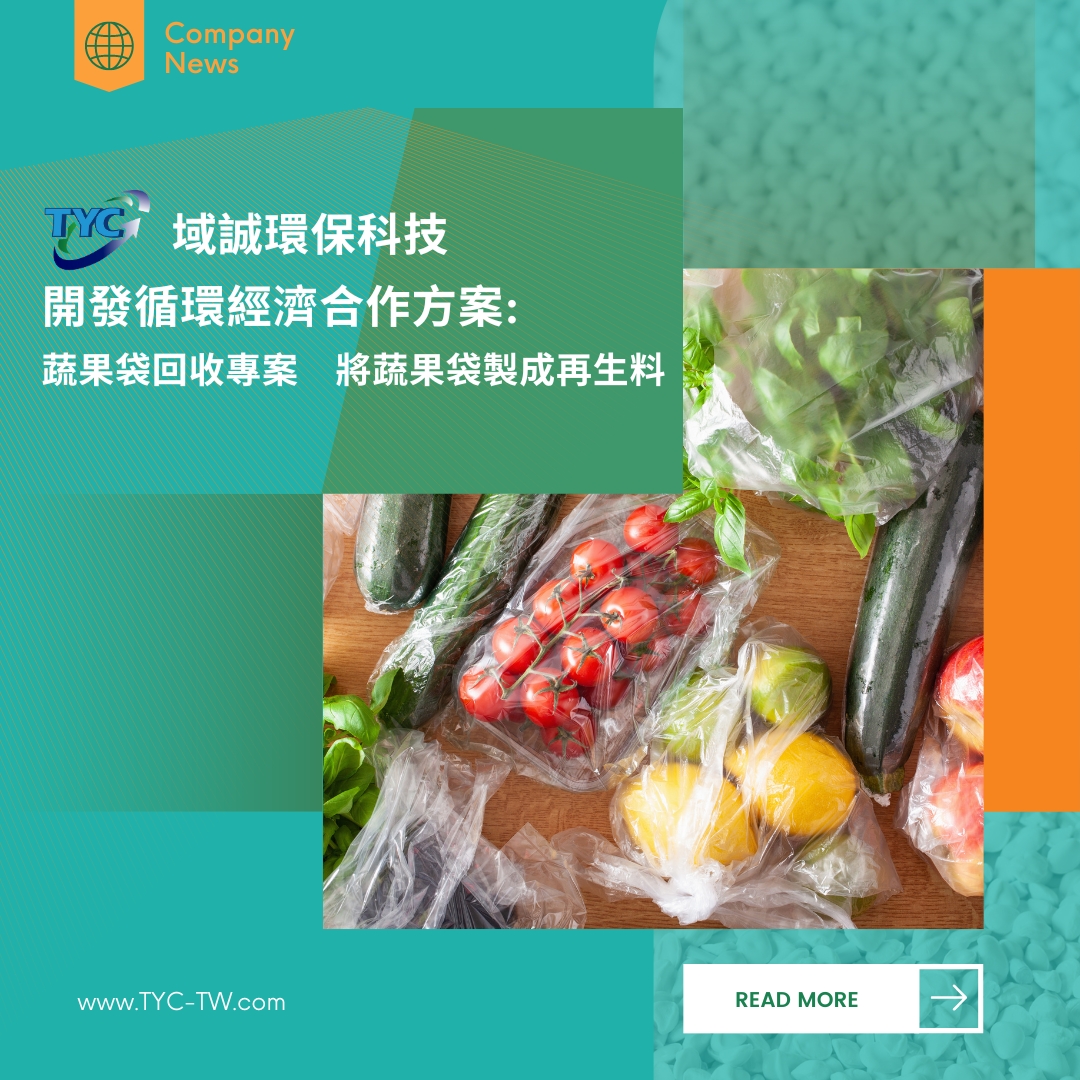NEWS & EVENTS
TYC Environmental Technology collaborates with the Plastic Center and the Homemakers Union to create a new model of circular economy
January 19,2024

Repost from Homemakers Union Consumers Co-operative.
【✋🏻 Five Steps to Recycling: Wipe, Cut, Organize, Pack, and Collect】
⭐ Key points for self-recycling of fruit and vegetable bags within the organization
- Only recycle fruit and vegetable bags from within the organization, do not mix with other plastic bags.
- Fruit and vegetable bags must be cleaned and free of foreign matter on the bag.
- Product description labels should be cut off with scissors to avoid residual glue on the bag.
- Bags must be dry, without moisture, to avoid a damp smell during the recycling process.
- Bags should be laid flat, not crumpled into a ball, to avoid taking up space when stacked for recycling.
⧉ Uniform Material for Effective Recycling ⧉
The general public already has a concept of recycling beverage bottles, paper, and glass. However, the recyclability of 'plastic bags' is a subject of debate. This is due to plastic film often being made into 'composite films' for transparency, breathability, and moisture permeability requirements. The mixed materials, difficulty in cleaning, added dyes, residual glue, and human-induced moisture make it challenging for recyclers to turn them into recycled plastic granules, hence they are not listed by the Environmental Protection Administration as mandatory recyclable items.
Since it is difficult to control the material and cleanliness of discarded film bags, such waste is typically treated as general waste. Common disposal methods include incineration, which produces dioxins polluting the air, and landfill, which is not easily decomposable and space is increasingly limited. Therefore, any plastic that does not enter the recycling system is a burden on the earth, a very real industry situation.
Since the internal fruit and vegetable plastic packaging bags are made of a single material, they meet the criteria for film recycling. Thus, as long as the plastic bags are cleaned, stickers removed, and prevented from carbonizing due to food residue or residual glue, they can enter the recycling system. After melting and granulation processes, they become recycled plastic granules with circular reuse value, just like industrial plastic molds.
⧉ Tripartite Collaboration for Economic and Environmental Balance ⧉
The head of the Material Technology Development Department at the Plastic Center, Li Yuli, said that due to the high impurity, variety, high technical threshold for processing recycled materials, and the complexity of sorting and transportation, although circular economy and sustainable development are hot topics today, few recycling businesses or companies have truly begun to address this issue.
For recyclers, compared to the annual production of approximately 140,000 metric tons of plastic bags in Taiwan, the cooperative can provide only a very small amount of recyclable plastic. There are many channels with higher plastic consumption, so initially, it was not easy to find a recycling partner until they approached the small and medium-sized satellite recycler Domain Cheng, which created an opportunity.
The general manager of TYC, Vicky Qiu , admitted to hesitating over this project because the key costs of the recycling system are sorting and transportation, both of which are challenging for household plastic bags. However, based on corporate social responsibility and environmental friendliness, and understanding that the cooperative consists of members with strong environmental awareness and a desire to reduce plastic, and with the cooperative's logistics able to handle preliminary transportation and sorting, they agreed to participate in the project. "The petrochemical industry brings convenience, but how to balance economy and environmental protection is what we value more," ESG everyone talks about, and TYC chooses to be the one to start reducing the earth's burden.
⧉ Establishing a Circular Economy, Hoping for More Channels to Participate ⧉
The product manager of the cooperative, Chen Siwei, said that the primary consideration of the recycling project is not to pursue a large volume of recycling, but 'quality' is the key to establishing a successful recycling model. Due to the high cleanliness requirements for film bags, our group of 'senior environmentalists' needs to work hard to remove dirt from the fruit and vegetable bags and keep them dry, in order to reduce impurities from the source and enter the recycling system, increasing the amount of plastic processed and reducing waste production.
After collecting the fruit and vegetable bags, the Plastic Center will conduct a physical analysis of the recycled film bag materials. By analyzing the processing performance and physical characteristics of the recycled PP film bags, the feasibility of recycling and remanufacturing will be assessed. If feasible, the recycled material from the fruit and vegetable bags will be processed through plastic processing techniques for end-product applications.
The recycling goal is not only to bring household plastic into the industrial plastic recycling process and establish a circular economy model, but also to build a demonstration case for retail industry film bag recycling and reuse, and then promote it to other channel operators or integrate with the industry chain. By voluntarily increasing the recycling of household plastic bags, the public can find the best solution for previously disposable plastic bags and develop backend applications, expanding the impact of plastic recycling.
#Learn more about the fruit and vegetable film bag recycling action
👉🏻https://reurl.cc/edeY9b
